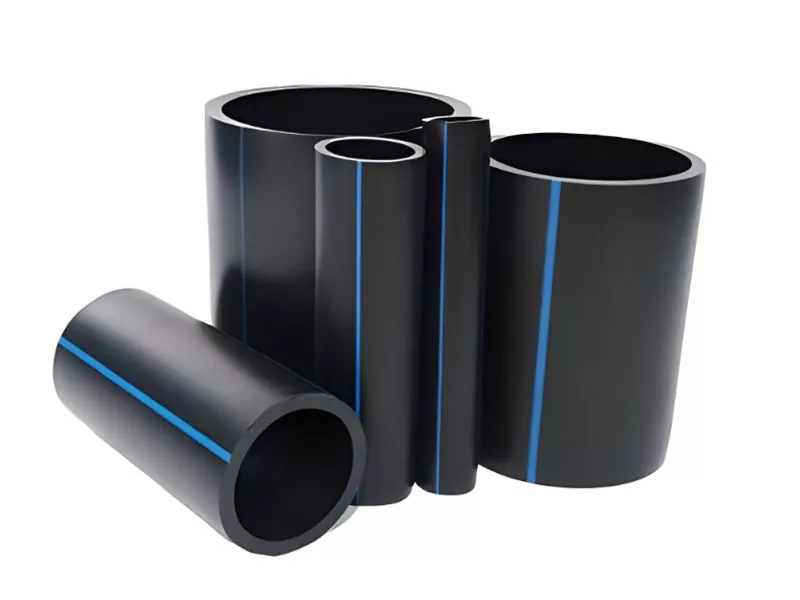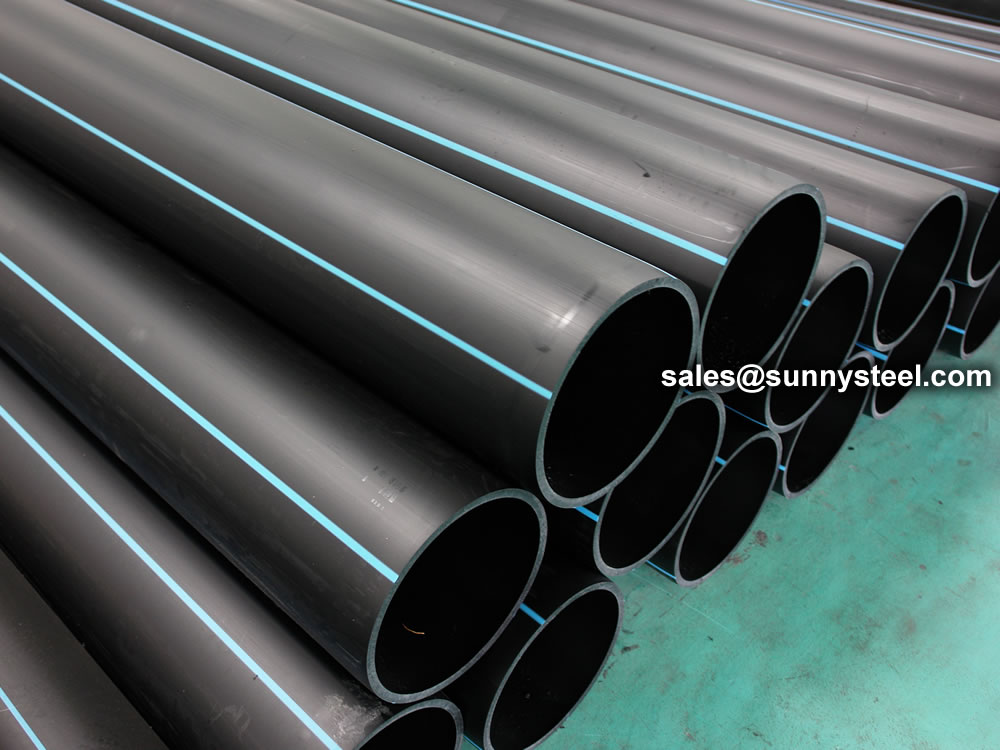How American Plastics HDPE Pipe for Oilfield Supports Oilfield Operations
Wiki Article
A Comprehensive Guide to the Different Uses HDPE Pipeline in Building and Sector
HDPE pipes have arised as a pivotal part in contemporary building and construction and industrial applications. Their unique homes, such as resistance to deterioration and light-weight design, make them suitable for a wide variety of usages. From water system systems to farming irrigation, HDPE pipes supply options that improve efficiency and sustainability. Recognizing their varied applications is important for experts looking to maximize framework. What certain benefits do these pipes give each industry?Water System and Circulation Solutions
Water and distribution systems are important components of city framework, typically relying upon high-density polyethylene (HDPE) pipelines for their durability and efficiency. These systems transport safe and clean water from treatment facilities to customers, making sure ease of access and safety. HDPE pipelines are favored for their resistance to rust, chemicals, and extreme temperature levels, which boosts their durability and minimizes maintenance costs. Additionally, their lightweight nature permits for easier installment and transport, making them excellent for numerous metropolitan and rural applications.The versatility of HDPE pipes enables them to be set up in tight rooms and around obstacles, minimizing the demand for considerable excavation (American Plastics HDPE Pipe Manufacturing). Furthermore, their smooth interior surface decreases rubbing losses, improving water flow rates. As cities remain to expand, the need for trustworthy supply of water systems raises, positioning HDPE pipelines as a lasting solution for modern infrastructure tasks. Their tested performance history makes them a recommended choice amongst designers and city organizers alike
Wastewater Monitoring and Therapy
Effective wastewater management and treatment are necessary for maintaining public wellness and ecological top quality. HDPE pipelines play a crucial function in this process due to their longevity, resistance to rust, and capability to withstand extreme chemicals. These pipelines are commonly made use of in different applications, consisting of sewer system, stormwater drainage, and wastewater treatment facilities. Their lightweight nature promotes much easier installation and transport, decreasing labor expenses and time.On top of that, HDPE pipelines have a smooth interior surface area that reduces friction loss, advertising effective flow prices. They are likewise much less susceptible to leakages and failures contrasted to traditional materials, guaranteeing that contaminants are included efficiently. Their flexibility permits for versatility in various dirt problems, making them appropriate for diverse ecological setups. As sectors progressively prioritize sustainable practices, the usage of HDPE pipelines in wastewater administration systems lines up with objectives for lowering environmental impact and improving resource recuperation.
Agricultural Watering Solutions
In farming settings, effective watering remedies are necessary for maximizing plant returns and taking care of water sources. HDPE (High-Density Polyethylene) pipelines play a crucial duty in modern watering systems as a result of their resilience, flexibility, and resistance to deterioration. Their capability to endure high pressures makes them ideal for both surface area and subsurface watering applications, ensuring consistent water circulation across areas.Farmers can utilize HDPE pipelines in drip watering systems, which deliver water straight to plant roots, lessening wastage and promoting healthy and balanced development. Additionally, these pipelines are lightweight and simple to set up, decreasing labor costs and setup time. Their long life-span and reduced maintenance needs further improve their appeal in farming methods.
In addition, HDPE pipes are eco-friendly, as they can be reused and do not leach dangerous chemicals into the dirt. This makes them a lasting choice for farmers intending to embrace green agricultural approaches while taking full advantage of productivity.
Industrial Applications and Procedures
Adaptability is a trademark of HDPE pipes, making them vital in various commercial applications and processes. These pipelines are widely used in chemical handling sectors because of their excellent resistance to a wide variety of destructive materials. HDPE's lightweight nature, integrated with high tensile toughness, enables for simple installment and lasting performance in requiring settings.In the oil and gas industry, HDPE pipelines play an important duty in delivering hydrocarbons and gases, thanks to their toughness and adaptability - hdpe pipe suppliers Midland TX. Furthermore, they are utilized in mining operations for the transport of slurry and various other products, where standard piping systems might fall short
Furthermore, HDPE pipes are increasingly utilized in producing facilities for water system have a peek at these guys lines and wastewater monitoring. Their ability to endure severe temperature levels and stress makes them appropriate for a range of industrial processes. Overall, HDPE pipelines add greatly to effectiveness and safety and security across diverse commercial applications.
Stormwater Monitoring and Drain Solutions
Stormwater management and water drainage systems are critical elements in metropolitan infrastructure, made to take care of excess rainfall and reduce flooding threats. High-density polyethylene (HDPE) pipelines are progressively utilized in these systems due to their longevity, versatility, and resistance to corrosion. These pipelines effectively move stormwater far from booming areas, decreasing surface area runoff and protecting against waterlogging.HDPE's lightweight nature helps with less complicated setup, reducing labor expenses and construction time. Furthermore, its resistance to chemicals and environmental stress factors guarantees durability and reliability in different environments. Along with typical drain applications, HDPE pipelines are also utilized in cutting-edge services such as environment-friendly infrastructure, that includes rainfall gardens and permeable sidewalks.

Often Asked Questions
Just How Does HDPE Pipe Compare to PVC Pipe in Expense?
In general, HDPE pipe often tends to be a lot more pricey than PVC pipe because of its improved toughness and flexibility. Nonetheless, long-term expense factors to consider, such as maintenance and life expectancy, might prefer HDPE in specific applications.
What Is the Life-span of HDPE Pipes Under Varying Problems?
HDPE pipelines generally have a life expectancy of 50 to 100 years, depending upon ecological problems, setup methods, and usage. Elements such as temperature, soil type, and exposure to chemicals can substantially influence their sturdiness.Can HDPE Water Lines Be Recycled After Use?
Yes, HDPE pipes can be recycled after usage. The reusing process includes melting down the material, allowing it to be repurposed right into brand-new products, thus promoting sustainability and reducing ecological effect connected with plastic waste.Are There Any Type Of Certain Setup Challenges With HDPE Pipelines?
Setup challenges with HDPE pipelines consist of proper jointing strategies, making certain adequate trench problems, and handling thermal expansion. In addition, skilled labor is called for to manage specific tools, which can make complex the installation procedure in numerous environments.
What Accreditations Should I Search For When Investing In HDPE Pipelines?
When buying HDPE pipelines, one need to look for accreditations such as ASTM, AASHTO, and ISO, which content verify quality and conformity with market standards, assuring durability and efficiency in different applications. - custom hdpe pipe manufacturing Midland TXReport this wiki page